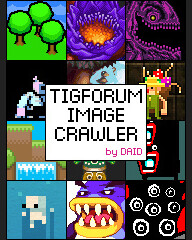Interview: Aaron Bishop, creator of SoulFu
By: Lorne Whiting
On: July 16th, 2011
[This is a guest post by Machine Saint]
Aaron Bishop is an independent game developer who may not be as familiar to members of the indie gaming community as he is to the open source software community (where his games are a bit more well-known, it seems). He is the creator of Egoboo and Soulfu, and he recently announced that he is working on a new game, plainly codenamed “Mystery Project X”. I thought this might be a good time to interview him for TIGSource, but, since the details of this new project are still a secret, it is not the core subject of the interview.
Machine Saint: Some people may not be aware of who you are, since you were more prominent in the open source software community than in the “indie games scene”. Can you say a few things to introduce yourself?
Aaron Bishop: Who am I? Well, nobody too important I guess… Really I’m kind of a hack when it comes to writing games — most of my ideas aren’t original, instead they’re just a bunch of ingredients that taste good in other games, all stewed together to see what we get. Probably the only thing that sets me apart from anybody else is that I’m like one of those old one-man-bands — I do almost everything myself.
MS: What are your feelings on the current status of your first project, Egoboo? Did you expect people to continue working with it for as long as they have?
AB: Hmm, Egoboo… That’s a game I wrote 12 years ago after having a brief dream about what it should be like — I really wish I could go back to 1980 or so and start over knowing what I do now… Thought there would be more development over the years, but it was a bit of a mess code wise — plus the control was never well developed.
MS: Do you think the direction the game has been taken in is similar to what you would have done with it had you continued to develop it yourself?
AB: If I’d continued to develop it myself, random level generation would’ve been in a lot earlier — had a nice algorithm working in a little test program, but just never moved it over… Egoboo is grid-based so it’s pretty easy math-wise.
MS: Have you been disappointed with the lack of continuation in the development of your second project, Soulfu? Why do you think it has not received as much attention?
AB: Nah, I’m not disappointed that SoulFu hasn’t seen much development — it’s really my own fault in taking so long to get it out the door… What was cutting edge in 2002 wasn’t nearly as great in 2007.
MS: How was your experience with selling Soulfu? What do you think you could have done to be more successful?
AB: Well, I tried to sell SoulFu as HonorWare — where people would just send me money and type “I paid Aaron” or something like that, but it didn’t work too well. Certainly could’ve made more doing it a different way, but it was more about trying an idea and seeing what happens. Didn’t really market it either — at that point I was just trying to cut ties with it and get on with my life.
MS: You eventually released Soulfu for free, as “NiceWare”. (In order to unlock the full game, players must swear that they have done something nice each time they play.) Was this your intention from the beginning, or was this because of poor sales?
AB: The NiceWare thing came about because the HonorWare thing didn’t work — Plan B, so to speak. Again, it’s another idea I wanted to try, and I do wonder what nice things people have done… I know my little niece gives out hugs!
MS: What are your feelings on open source games in general? Should more people be releasing the source code to their projects?
AB: My opinion as far as OpenSource games go is that the code really isn’t that important — yeah it makes the game tick, but the artwork is the real painstaking/time-consuming part of it. Back in the x86 assembler days, code was important — but now there are so many libraries (OpenGL for example) that the hard parts are done for you…
MS: What can you tell us about your next project?
AB: Mystery Project X is still under wraps — it’s designed to be less artwork intensive than the last project, but will hopefully make up for that with multiplayer networking and physics modeling. [Ed.- This interview was conducted before the video at the top of the article was released, whether it’s the project referenced here is unknown]
MS: How did you come to be interested in game development in the first place?
AB: I’ve been designing games ever since I was a little boy — it’s a shame they take so long to write… I love thinking of ideas for games and have several hundred I’ll never get around to (some of which are actually originalish).
MS: Do you have any interest in interacting with other game developers? Have you ever thought about attending events like GDC?
AB: The only game developer that I’d be interested in working with is Richard Garriott — though my brothers and I might get something together one of these days…
-
Lorne Whiting
-
Vania
-
Anonymous
-
Anonymous
-
Lorne Whiting
-
Lorne Whiting
-
neil
-
Nanashi Rider
-
Honest Guy
-
Honest Guy
-
Bakariboss
-
Nektonico
-
JConaBike
-
http://pulse.yahoo.com/_GGOGZUZUP2VFCJYMRVYUYS6EMU Retloc
-
Banana Stand
-
http://www.facebook.com/laurensmathot Laurens Mathot
-
Daid
-
Narvius
-
Anonymous
-
Nerdbot
-
pnx
-
Arne Döring
-
Arne Döring
-
Anonymous
-
No
-
Subrosian

